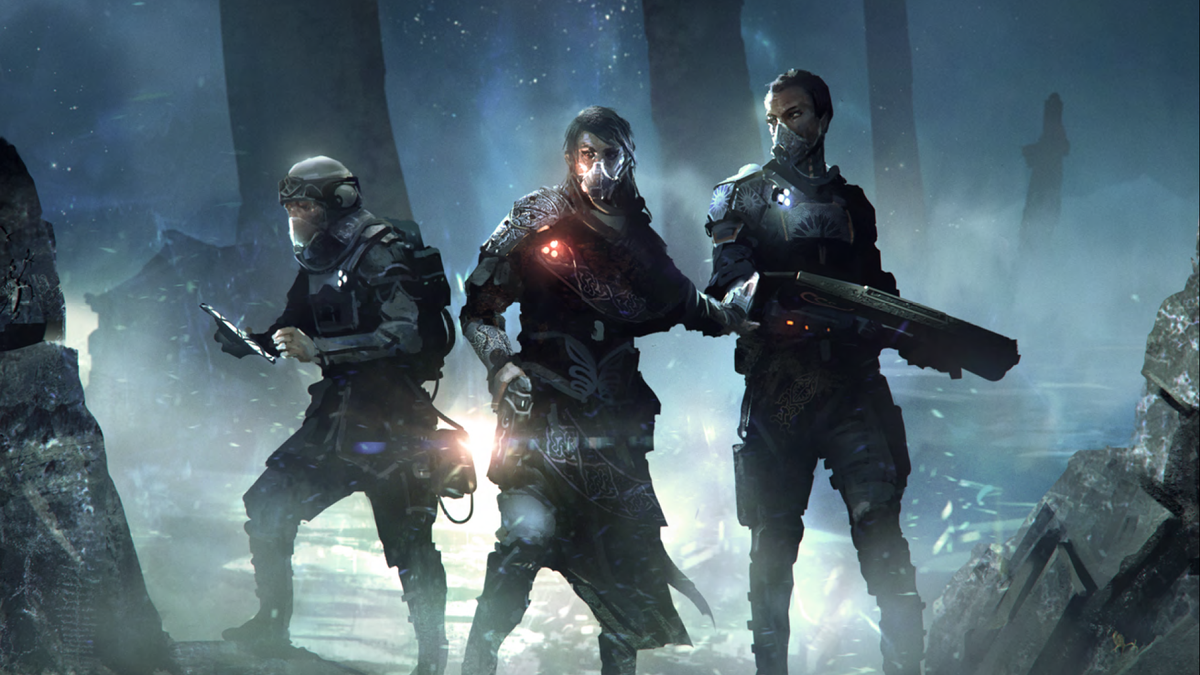
Free League Publishing seems determined to prove itself in every game genre available, and I am happy to be along for the ride. I was charmed by their 80s kids adventure Tales From the Loop, I adored their post-apocalyptic community building game Mutant: Year Zero, and I am over the moon with their Arabian Nights inspired Coriolis: The Third Horizon. Continuing in the vein of focused, simple mechanics, Coriolis melds science fiction and mysticism to create a game well worthy of your attention. That’s not to mention the production values, which continue to push the boundaries of what we can expect in a core book release.
In the setting of Coriolis, space is dark and mysterious, suffused with palpable energies that drain you and make exploration a dangerous prospect. The inspiration is clearly stated as Arabian Nights in space, something I know we have been seeking for many a year. Mankind left Earth in several waves. The first by means of two massive colony ships, one of which disappeared into the unknown. The second arrived at its destination (the 36 system array of connected world known as the Third Horizon) after a long journey through the dark to find a surprise waiting for it: human colonists who left far after their date of departure, arriving first by means of newly discovered portals left by a prior civilization. The two cultures diverged massively in their time apart, as the starfaring Zenithians were a practical people but the portal-jumping Firstcome allowed themselves to become steeped in religion. This sets the stage for multiple factions of each to vie for control over the Third Horizon, all while battling against the dark unknown between.
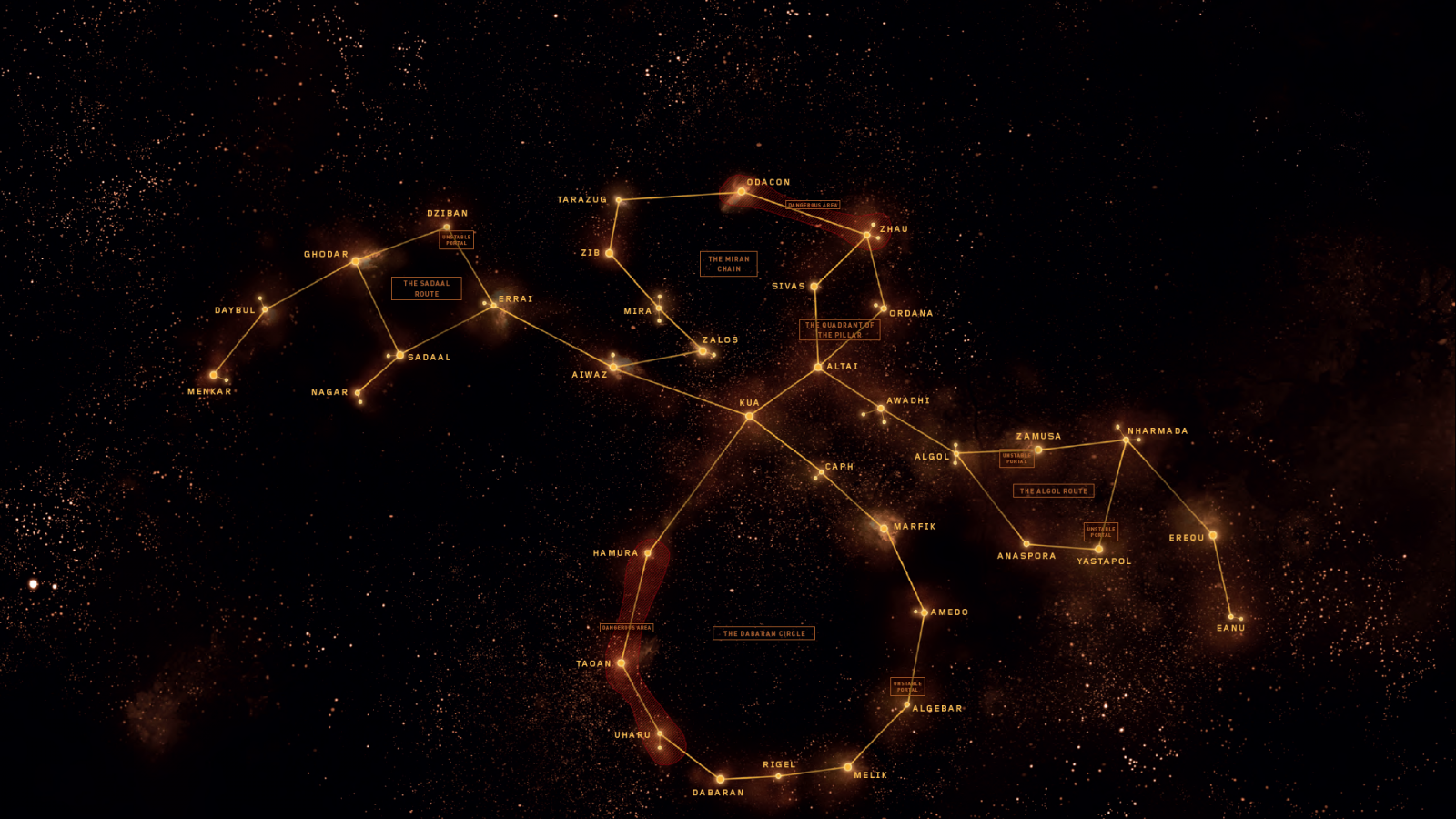
What’s in the Book?
The corebook itself is an impressive feat of graphic design and artistry. You will see a diverse array of spatial anomalies, dark entities, and inhabitants of the new worlds. Each is tinged with an air of mystery, suggesting horrors lurking in the unknown, as well as small flourishes that inform you about the setting. The Arabian influence is strong, with motifs reminiscence of mosques and middle eastern iconography, but also practical to the needs of a space faring people. Even the paces are given no mere black border, but are edged with astronomical bodies and the ever-present darkness of space. Reading this book, I felt like I was looking into something frightening and vast, and I was eager to explore it the more I had it in my hands.
Practically speaking, the book is 384 pages of unadulterated badass. Contained within this meaty core book are plentiful character options, maps, lore both localized and setting-wide, a decadent monster manual, GM advice, spaceships and space combat rules, a premade adventure, a massive space station ready to go, and even an index which is…functional if not elaborate. If Free League never released a supplement, I would still feel like I had more than enough to run this game for the rest of my life.
The layout also clearly denotes which information is important or supplemental, and the book is organized in a logical fashion. The only issues are that there is often information spread across so much of it, and that there is so much to dig through once you do become interested. Occasionally you will find yourself paging through to find relevant information that you feel should be easier to locate. Practically speaking, the book is weighty and well bound, and I don’t worry about carrying it with me or using it over time.
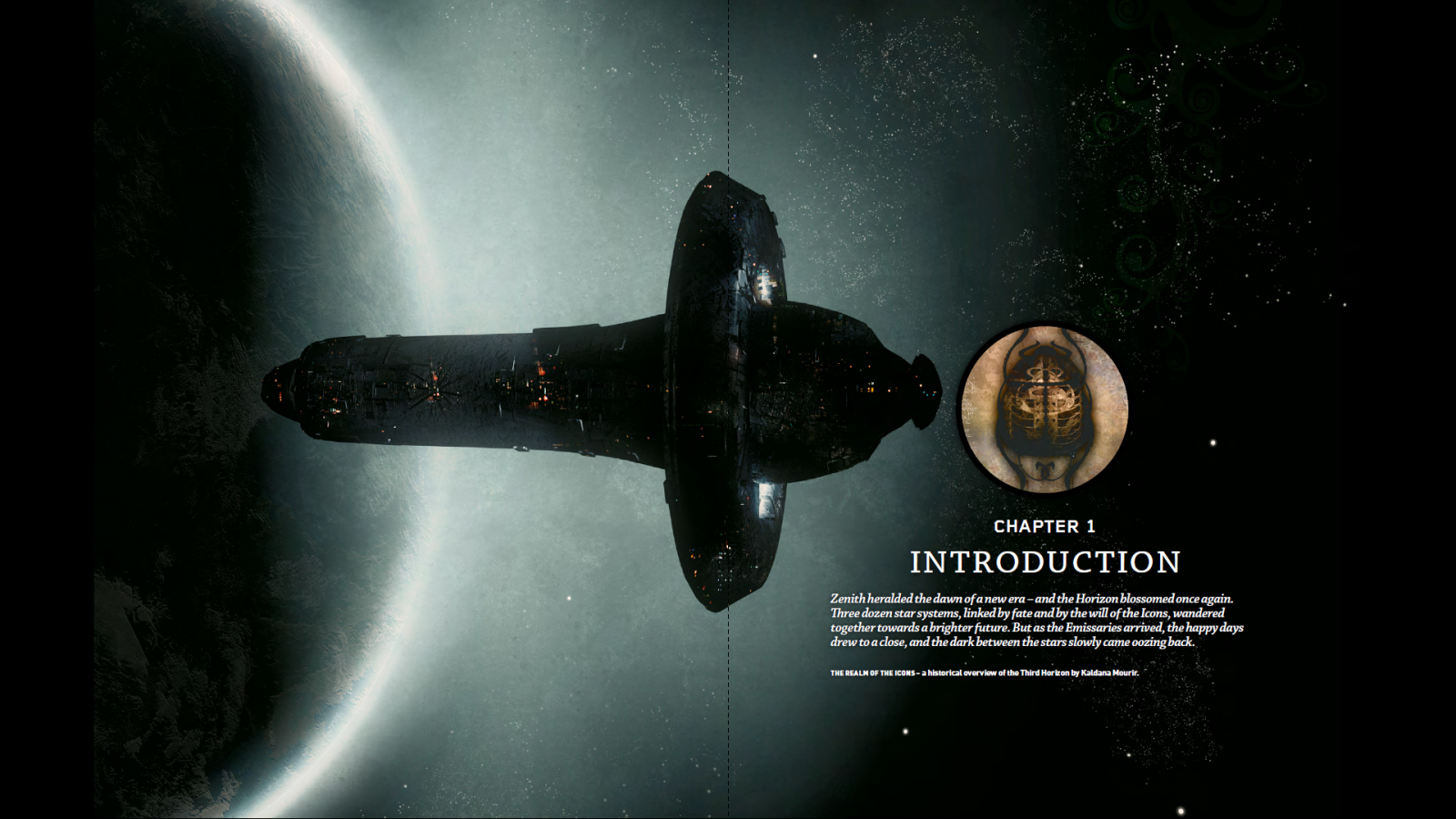
This is the spread we get for a chapter introduction. They didn’t have to go to these lengths to create mood, but it makes a big difference that they did
Mechanics and Character Creation
The backbone of the game, just like Free League’s other offerings, is dead simple: your attributes and skills have a rating from 1-5 (under most circumstances). You will form a pool of d6s by adding relevant attributes and skills, as well as any modifiers that may be in play, and roll those dice. Any 6s that show up are successes, and in the case that you do not succeed, or want additional successes to power bonus abilities, you can choose to Push. Pushing requires your character to stop and pray to the god they worship, and grant the GM a Darkness Point, which he or she will use to fuel a number of nefarious abilities of monsters, or otherwise stymie the party.
Darkness Points are a minor mechanic that will give you a ton of leverage to make your game feel more alive. Players accumulate them through Pushing and extended travel through deep space. While they can be used for simple tactical advantages, such as allowing an enemy to take the initiative or use a special ability, they also encourage GMs to be creative with their setting and events. DP can cause harmful weather effects, or force a character’s backstory to come back and haunt them in some way. While no one needs a mechanic to enforce these events, I appreciate the way the book subtly suggests to GMs that they use otherwise ignored tools at their disposal to make the narrative engaging.
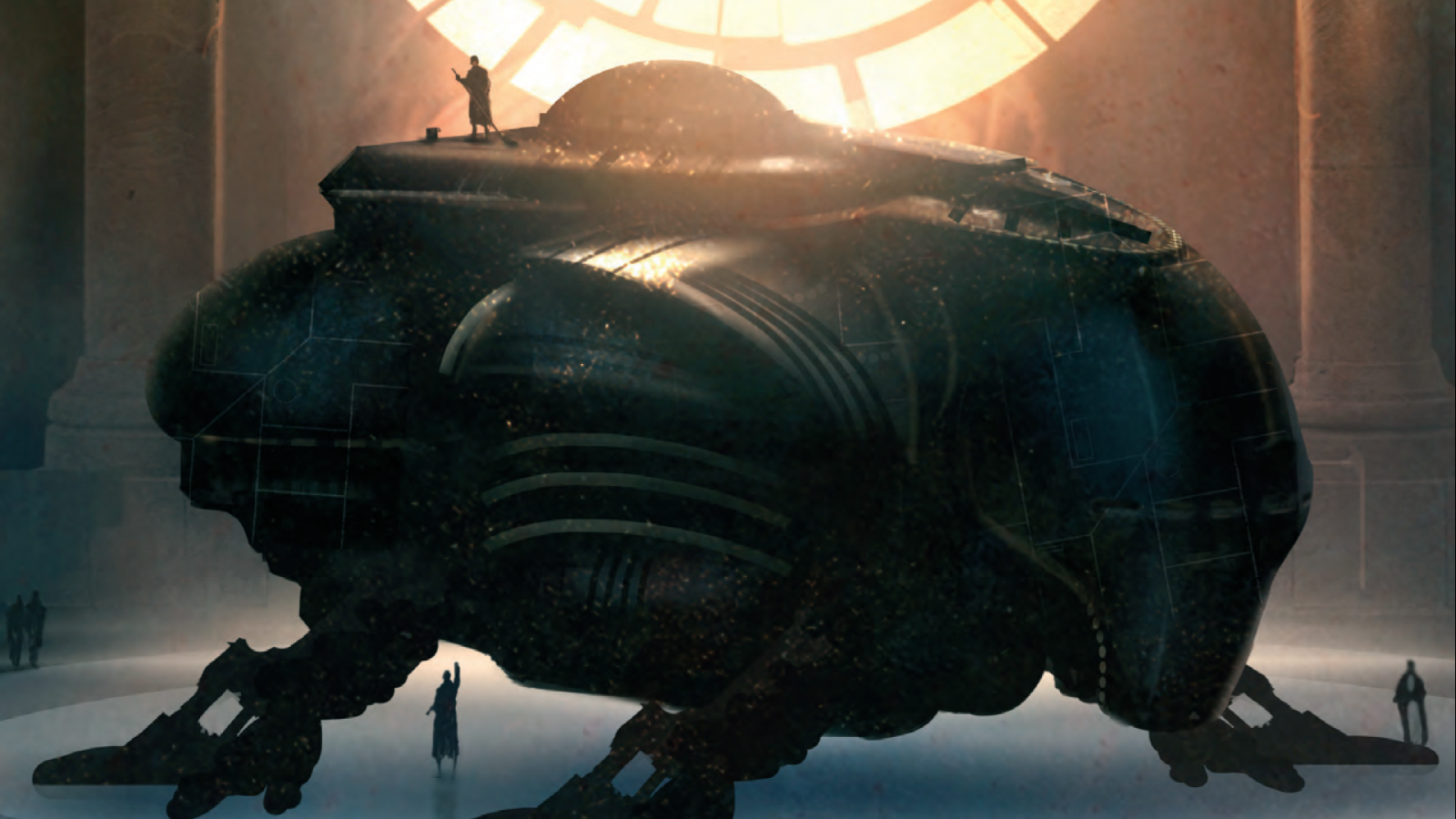
Something the book takes time to do is show you the setting from the perspective of the average people, who eat, clean, and give the Third Horizon life
Character creation, much like everything in the game, is simple yet deeply satisfying. You first choose from three basic upbringings, which provide differing levels of attribute points, skill points, wealth, and reputation (another currency which sometimes carries more weight than money). You then choose a Talent, which contain a surprising variety, including cybernetics, psychic abilities, racial specialities, and more. Yes, you can play as one of a number of non-human races. The book recommends against it, but makes very clear the bonuses and penalties associated. That done, you choose which of the nine gods your character worships, purchases gear, and decides (based on appropriate skillset) which position on your ship’s crew they will play as.
Working together with your party, you will create a group with its own personality. You can choose which faction, if any,to work for, but must explicitly choose a talent that permeates the entire group, a patron to whom you are indebted for your ship, but will work to benefit you, and a nemesis to dog your heels in the Third Horizon. None of the decisions you make during character or group creation are terribly complicated, but they are satisfactorily deep, with many narrative decisions coming from simple mechanical ones.
Combat is simple, efficient, and very deadly. You roll your attack skill, relevant attribute, and weapon bonus against a target number, and if you hit, inflict the weapon’s damage rating. However, each weapon also has a critical rating, which is the number of extra successes required to inflict critical wounds. Weapons with low critical ratings are easy to trigger, but may only temporarily stun opponents, but weapons with higher criticals could easily turn lethal. Characters can go down quickly, and you will need to manage threats carefully to survive. All the while, you will need to keep an eye on your Mind Points, which deteriorate as you experience stress, and can force a breakdown if they go low enough. As you break down, you risk losing mind points permanently, and going to zero will render your character unplayably insane.
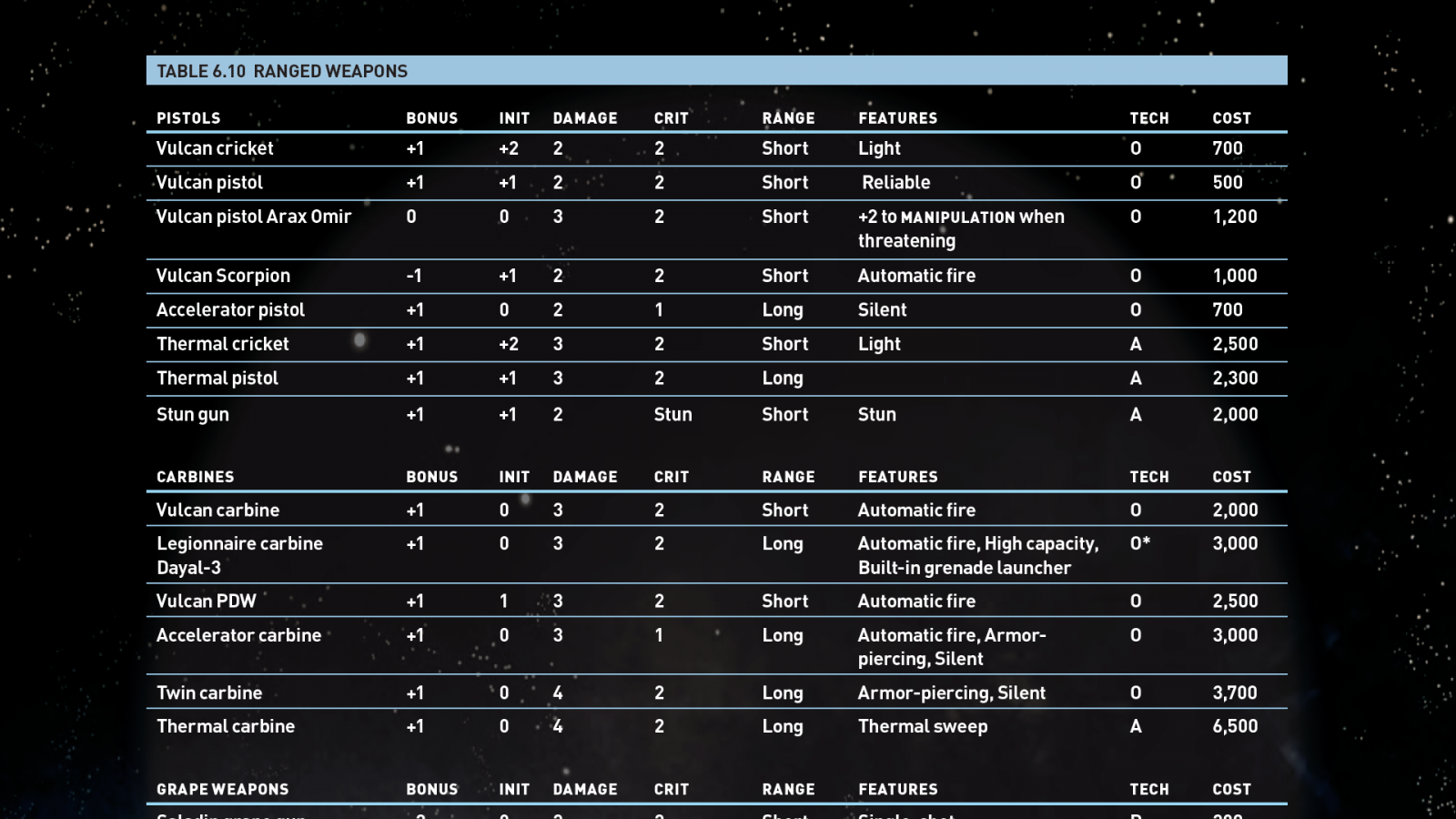
Though you have a wealth of equipment to choose from, you won’t have to wade through small modifiers to understand their various benefits and drawbacks
If there is any place that might be challenging due to complexity, it’s in the realms of starships. While character creation and combat are easy to get your head around, spaceship creation and space combat are another endeavor. This is by far from the most involved I have seen either rulesets in RPGs, but trust me that there is a LOT to eat into if you want to. Ships have tons of variation in modules, armor, size, weaponry, armor, and more to choose from. Space combat, which appreciably has special actions for every member of the crew, is pretty simple in practice but takes a lot to get your head around the first time through. The rules feed into one another logically, but take a fair amount of work to learn, given the number of phases, actions, and ship modules that come into play.
Monster stats, of which there is a great variety, each with its own lore and history, are incredibly easy to use. You can fit their stats into small notecards if necessary, and won’t have to flip the book to reference smaller tags or powers to do so.
Special Note: the wonders of starting small
The designers of Coriolus made a wise yet often ignored decision to mitigate the book’s one primary flaw. See, in a book with this many options and lore, it’s a lot of buy-in for a new GM. Part of the reason this review dropped so long after the book came out is because of just how much there is to eat through if you sit down to do it. Character options and lore take a good few days of reading to properly appreciate, and any GM or player looking to get into the game for the first time have a major task on their hands. Or rather, they would, were it not for the decision I alluded to earlier: giving you multiple, simple points of entry that allow you to set the heavy lifting for later.
Players can pick from a GENEROUS array of premade spaceships if they don’t want to delve into the rules for creating one from scratch. They can also make a few simple decisions from partially premade characters instead of going through the entire process. GMs can read through a quick summary of the setting early in the book instead of the dozens or hundreds of pages of lore to learn everything. They can then start the game on Coriolus, a single space station, before reaching out into the universe as a whole. Each planet is given its own section, to allow you to focus on one at a time (and rest assured, there are plenty of secrets and adventure hooks locked away in these pages). The book also provides a sample adventure on Coriolus itself, to help get you going. While there is plenty available to digest, there is no reason to be daunted by this game’s size.
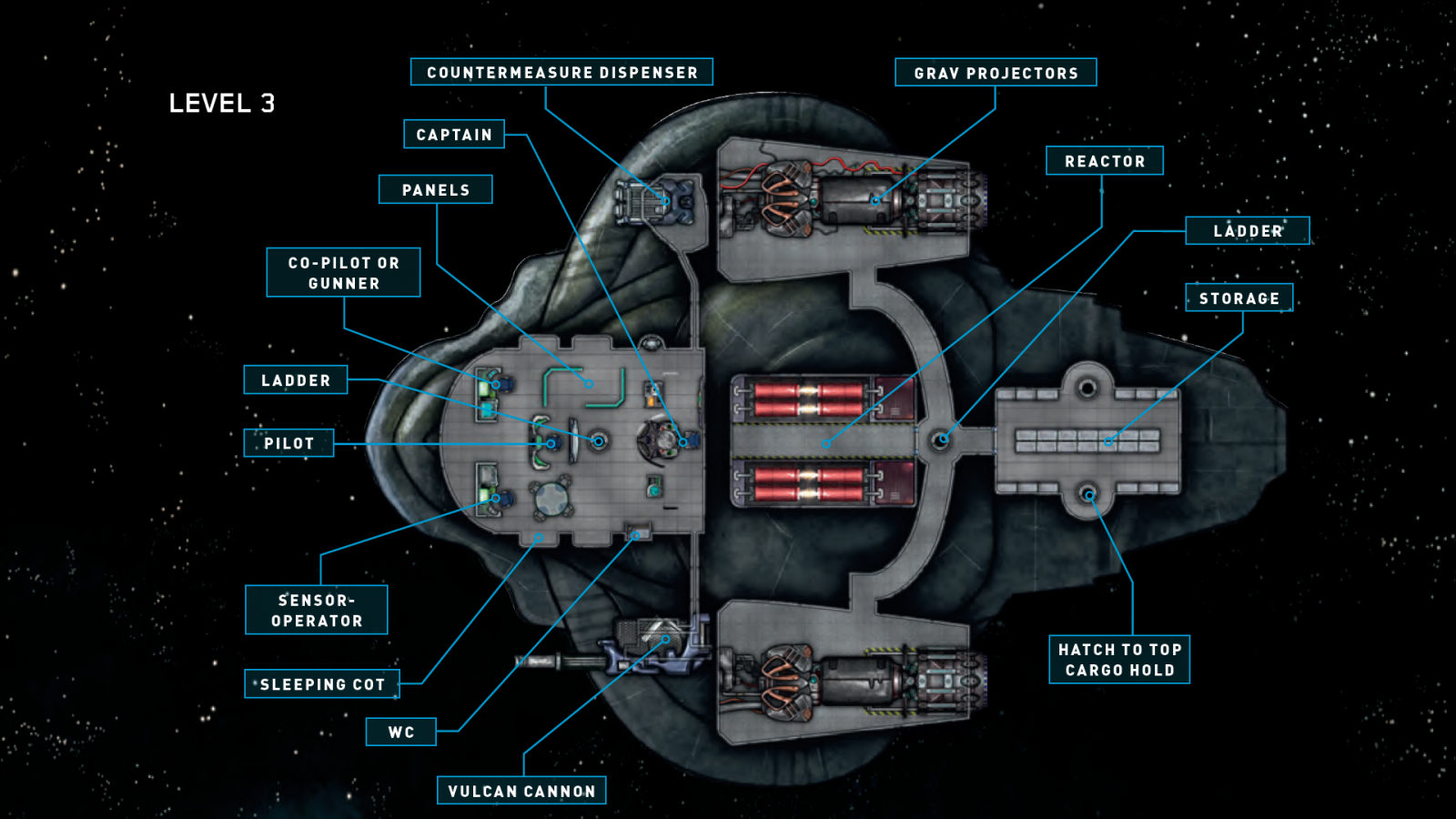
Coriolis has perhaps some of the most usable spaceship maps I’ve ever seen, and I know that’s a weird niche taste but I’ve been looking for it for a long time
That said, I think the one thing this book would benefit from is some kind of quick reference. It’s easy enough to navigate, but a lot of rules still feel scattered over its many pages, and it would help if some of them were collected in a single place. I have not seen the game’s GM screen, but it might be everything I’m looking for, and feels necessary to save you a great deal of time during the game.
Setting and GM advice
The core conflict of Coriolis is fascinating: the older colonists who set forth later have a deep culture that is being shaken up by their more goal-oriented forebears. Religion, trade, and military have to contend with the cultural shakeups, and there is plenty of room for you to experiment. The book describes groups of factions within the Firstcome and Zenithian, each with their own goals and methods. These factions do create a lot of good lore and interplay, but unfortunately are not always well explained. Sometimes you will have to read the same faction several times just to determine what exactly they are and what they want.
The mysticism is another noteworthy element, and one that you can choose to modify for your table. The dark between the stars is a living, malevolent entity, and the Third Horizon is inhabited by all manner of dark spirits and mysterious beings. You can decide to relegate these legends entirely to myth, or bring it to the forefront for a game about mystic adventure. There is plenty of creative white space to give you adventure ideas as well, such as the mystery of what befell the missing colony ship.
In having nine gods, the setting removes one element from Arabia which one might consider an integral part of its identity: the presence of Islam itself. Arabian Nights was, after all, compiled during the Islamic Golden Age, so is something lacking in not including Islam itself as a part of the setting? On the one hand, we are missing a chance to educate about a religion that formed a major part of the world’s history, with an intellectual legacy that remains an influence today. On the other, Free League got the chance to use cultural motifs while injecting additional variance into the religion by means of the other gods, and more importantly skip out on a lot of baggage that comes with portraying Islam in fiction. I do think making a more direct adaptation of the Islamic Golden Age in game form could have worked out, but the Third Horizon is portrayed with enough of its own life and creativity that it isn’t ultimately worse for this omission. I still hope it inspires people to read the source material, and delve into the culture that inspired this work.
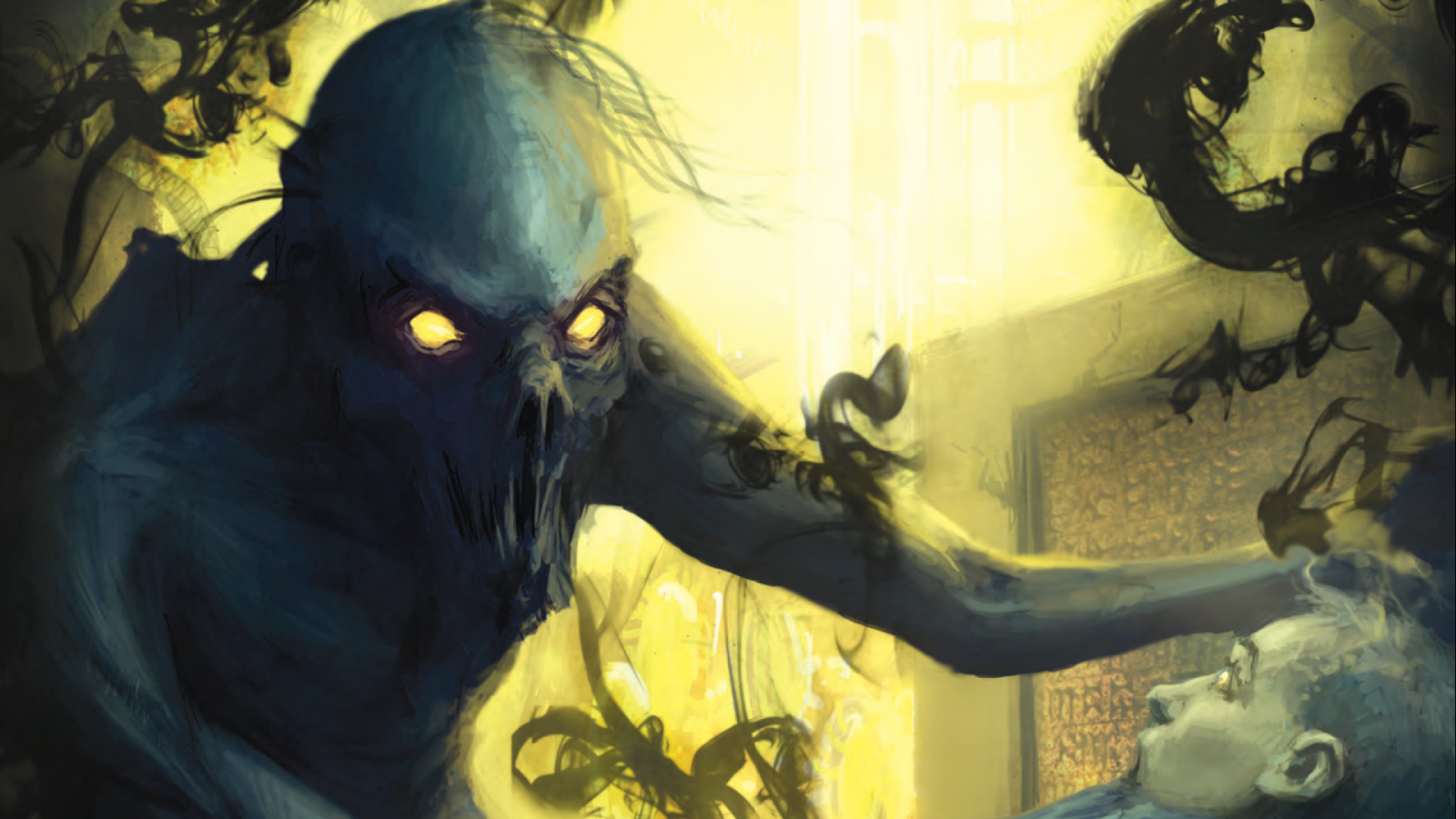
While you can relegate the supernatural to myth and legend, you will be missing the terrific potential for horror that Coriolis presents
This setting has very little in terms of metaplot that will force you to memorize plot details, but is full to the brim with creativity and potential. You can easily play mystery, horror, political intrigue, high adventure, space opera, and more in Coriolis, and do so with tremendous ease.
If there is anything that the book may be lacking (and note that I say this not having played at high levels), it seems that the power levels and character building would break down during a longterm game. I can’t say with certainty, but there is little in terms of character builds here, so beyond grabbing certain talents and gear, past a certain point I don’t sense much you would be able to do with a character.
There is a 74 page quickstart available for free, and if you are even passingly interested I would advise you to pick it up. Once you get through that, you will know the bulk of information necessary for a full game, and the core book and adventures will be ready to enhance your experience to its full potential.
Coriolis: the Third Horizon
Excellent
Coriolis is a testament to caring about your material. Everything from the layout and mechanics to the lore and monster stats is tailored to a play experience that maximizes accessibility without sacrificing depth. While the setting has fascinating in-built concepts, it coverrs an admirable range of game types. Free League has only been improving with every release, and this may just be their best game yet.
Pros
- A fresh, engaging Arabian Nights space opera setting
- Simple yet effective rules that enforce the game’s themes
- Exemplary art and layout make for a standout book
Cons
- The book asks a lot of buy-in to fully utilize
- A quick reference is necessary during play
- Factions are sometimes poorly explained
